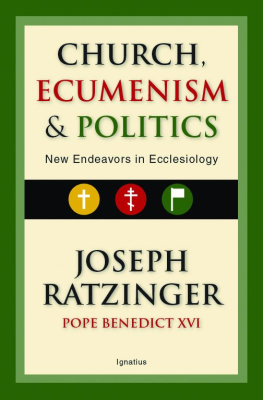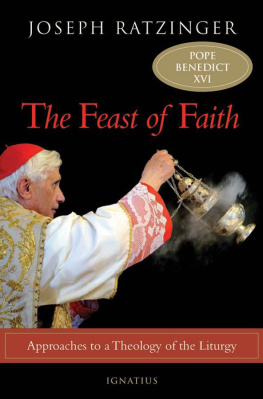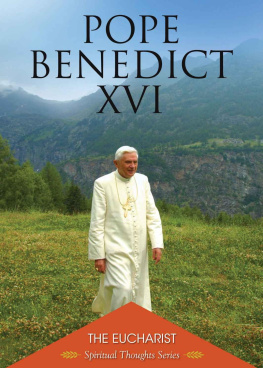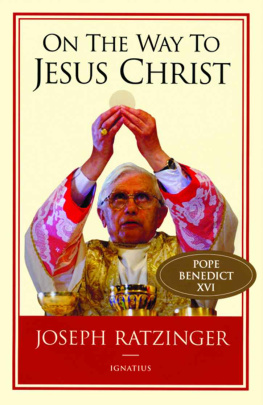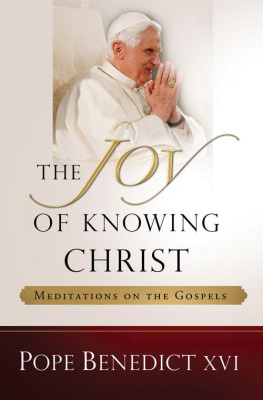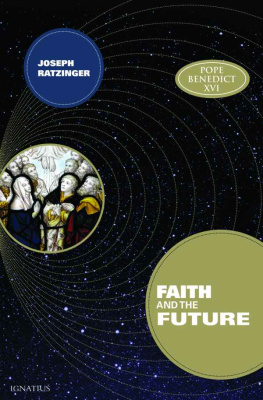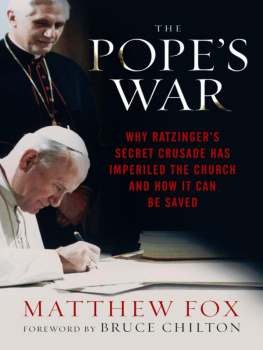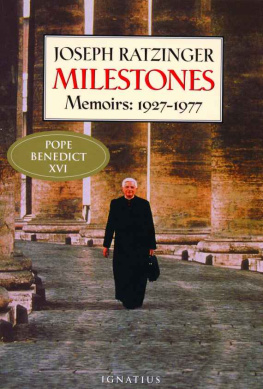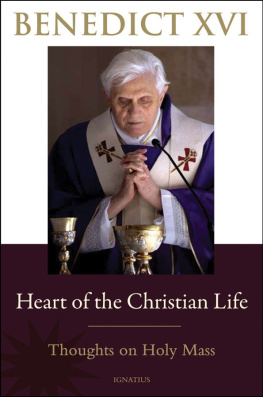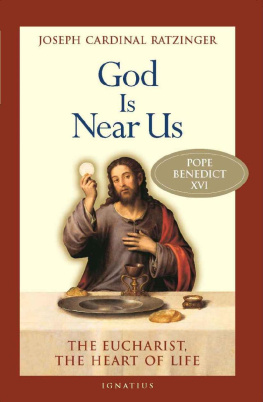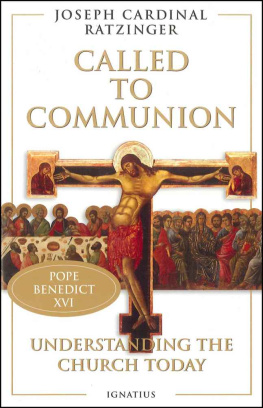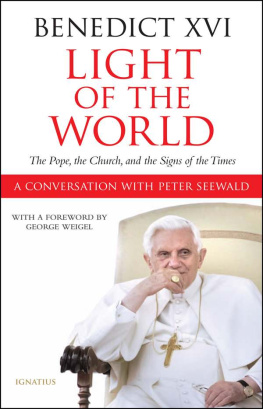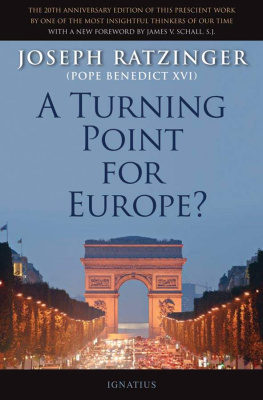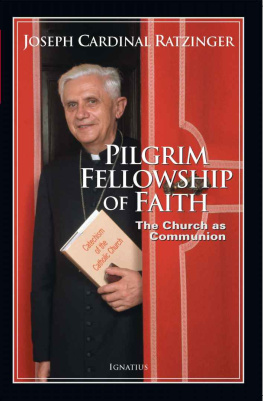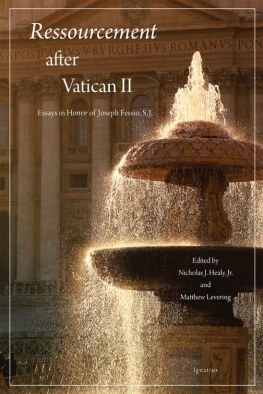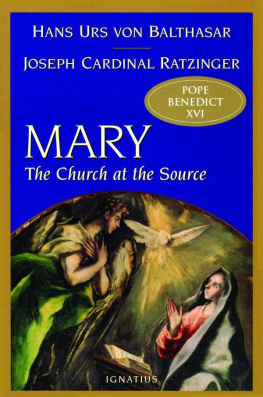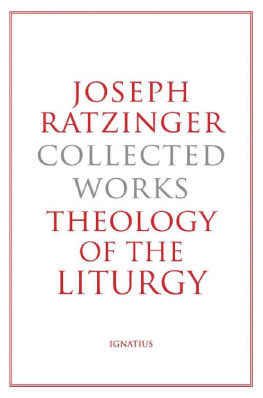Church, Ecumenism, and Politics
New Endeavors in Ecclesiology
JOSEPH CARDINAL RATZINGER
(Pope Benedict XVI)
Church, Ecumenism, and Politics
New Endeavors in Ecclesiology
Translated by Michael J. Miller et al .
IGNATIUS PRESS SAN FRANCISCO
Original German edition:
Kirche, kumene und Politik
1987 by Edizioni Paoline s.r.l., Cinisello Balsamo, Italy
Unless otherwise noted, Scripture quotations (except those within citations) have been taken from the Revised Standard Version of the Holy Bible, Second Catholic Edition, 2006. The Revised Standard Version of the Holy Bible: the Old Testament, 1952, 2006; the Apocrypha, 1957, 2006; the New Testament, 1946; the Catholic Edition of the Old Testament, incorporating the Apocrypha, 1966; the Catholic Edition of the New Testament, 1965, 2006, by the Division of Christian Education of the National Council of the Churches of Christ in the United States of America. All rights reserved.
Quotations from the documents of Vatican Council II are from Austin Flannery, O.P., general editor, Vatican II: The Conciliar and Post-Conciliar Documents (Grand Rapids, Mich.: Eerdmans, 1975).
Chapters 5, 13, and 14 are reprinted with permission from Communio: International Catholic Review (see Sources, p. 257).
Cover by John Herreid
2008 by Libreria Editrice Vaticana, Vatican City
2008 by Ignatius Press, San Francisco
All rights reserved
ISBN 978-1-58617-217-6
Library of Congress Control Number 2007928867
Printed in the United States of America
CONTENTS
ON THE NATURE AND STRUCTURE OF THE CHURCH
I. The Church as the Body of Christ
1. The image of the Mystical Body
2. Eucharistic ecclesiology
II. The collegiality of the bishops
III. Church as People of God
APPENDIX: Modern variations on the People of God concept
I. The spiritual basis for primacy and collegiality
1. Collegiality as the expression of the we structure of the faith
2. The interior basis for the primacy: Faith as responsible personal witness
II. Retrospective proof: The martyrological structure of the primacy
1. The witness structure of the primacy as the necessary consequence of the opposition of world and Church
2. Toward a concept of the primacy understood in martyrological terms
3. Conclusion: A view of the situation in Christendom
I. The synod of bishops according to the new Code of Canon Law
1. Nature and purposes of the synod
2. Additional provisions
3. Result
II. Questions about synodal reform
1. Unusable models
2. A clarification of fundamental elements of the Churchs constitution
3. Concluding reflection: Why hold synods ?
ECUMENICAL PROBLEMS
I. Introduction: Agreed statements and the position of the Roman Congregation for the Doctrine of the Faith
II. The fundamental problem of the dialogue: The authority of tradition and the central organs of unity
1. Preliminary note on the status of the discussion
2. The authority of tradition
3. The universal Church and her central organs as the prerequisite of tradition
4. Tradition and belief
5. Tradition can never be concluded
6. Tradition and Eucharist
III. Conclusion: Prospect for the future
APPENDIX
I. Review of the debate over my article
II. Two fundamental motifs of modern ecumenical theology and their problematic nature
1. The conciliarity of the Church
2. Traditionibus or sola scriptura? A new ecumenical formal principle
An Interview with Joseph Cardinal Ratzinger
APPENDIX
A letter to Theologische Quartalschrift, a periodical published in Tbingen
CHURCH AND POLITICS
Section One : Fundamental Questions
A Homily
I. What is theology?
II. Church and theology
III. The notion of Church politics
IV. Church politics and theology
A Lecture Given to the Reinhold Schneider Society
I. Nature and importance of conscience
II. Las Casas and the problem of conscience
Section Two : Dimensions of the Concept of Freedom:
ChurchStatethe Eschaton
I. The concept of freedom in modern intellectual history
1. The starting point in the fundamental approach of the Enlightenment
2. Freedom through institutions
3. Freedom through the logic of history
II. The modern concept of freedom in the life of the Church
1. Toward a definition of freedom
2. Applications of the modern understanding of freedom in the Church
III. Notes on the biblical concept of freedom
IV. Conclusions on the subject of freedom and constraint in the Church
On the Indispensability of Christianity in the Modern World
I. The three roots of the contemporary threat to democracy
II. Self-criticism of the political influences of Christianity
III. The indispensability of Christianity in the modern world
I. Counterimages to Europe
1. Back before Europe
2. Escape into the future
3. Marxism
II. Positive components of the concept of Europe
1. The Greek heritage
2. The Christian heritage
3. The Latin heritage
4. The heritage of the modern era
III. Theses for a future Europe
I. The chiliastic model
II. The model of the Great Church: Synthesis of eschatology and utopia
III. The utopian city of the monks
IV. The evolutionist design of Teilhard de Chardin
The anthropological vision of the Instruction Libertatis conscientia
I. The question about the fundamental conception of freedom
1. Ethos and history
2. Anarchy and obligation
3. Practical consequences
II. The contribution of the Bible
1. Exodus and Sinai
2. The universalization of the Exodus through Christ and its consequences
3. Political rationalityutopiapromise
III. Closing remarks: Likeness to God and freedom
FOREWORD
The lectures and papers collected here form a sort of second volume to the ecclesiological essays that I published in 1969 under the title Das neue Volk Gottes (The New People of God). The basic themes have remained the same: the question of the nature of the Church and her structure, the questions of ecumenism and of the relation between the Church and the world. In many respects, however, the emphases have shifted, and it has become necessary to ponder these issues anew. The growing number of ecumenical joint declarations has made the dialogue among the Churches and ecclesial communities concrete in a way that was unforeseeable twenty years ago [that is, in the 1960s]. At the same time, the fact that all this consensus has still not brought about unity makes it necessary to give careful thought to the fundamental questions: Where does ecumenism stand, and how should it proceed? The problem of Christian service to the world, which was formulated in rather general terms at the Council, has come to a head dramaticallydue in particular to the theologies of liberationraising urgent questions about faith and politics, about the relationship between liberation and redemption.
Thus the controversy about Christian ecumenism and current efforts to establish the right relation between faith and politics figure in the foreground of the reflections in this volume. Some of the articles reprinted here sparked lively debates when they were first published, to which I have responded by means of explanatory notes or newly added postscripts. I hope that this expedient makes clear the dialogical character of these essays, which seek, through listening to one another, to hear better the One who is the Word and the Truth in person.
Joseph Cardinal Ratzinger
Rome, Solemnity of All Saints, 1986
PART ONE
ON THE NATURE AND STRUCTURE OF THE CHURCH
Next page
